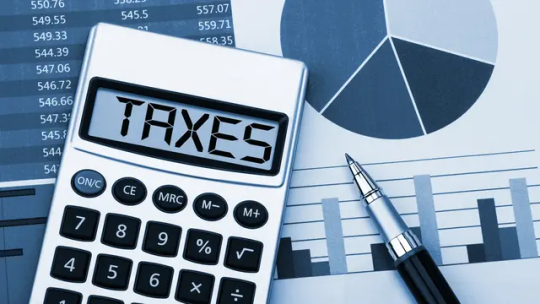Don't wanna be here? Send us removal request.
Text

All You Need To Know About Taxes in Pakistan
A major source of income for the government of Pakistan is through taxes, which ultimately help fund public services such as building infrastructure, healthcare, education and defence. Collection and regulation of tax all over the country is the responsibility of the Federal Board of Revenue (FBR). Understanding the different tax types and how they are calculated is something both individuals and businesses must understand to maintain compliance and avoid facing any legal issues.
Types of Taxes in Pakistan
In Pakistan, the taxation system is comprising of two broadly divided segments, direct taxes and indirect taxes. And each type has its own implications for individuals and businesses.
Direct Taxes
Direct taxes are���levied on individuals and corporations in relation to their income and profits. Income Tax is the most important direct tax in Pakistan, it is imposed on progressive rate, means the more you earn the more tax you pay.
Direct taxes include:
Income Tax: Paid by individuals, salaried employees and businesses based on their earnings.
Corporate Tax: Charge on companies as per their profits.
Capital Gains Tax: Tax on profits from the sale of assets like real estate and stocks.
Number of payments: Withhold tax: Discharged at the source from a number of transactions, including way wages, dividends and real estate sales.
Super Tax: This is an additional tax on high-income people and businesses.
Indirect Taxes
Goods and services tax as the name suggests is an indirect tax as it is collected by the business from the consumers at the point of sale. These include:
What is Sales Tax?Sales tax is tax on the sale of goods and services applied at 17% standard rate in Pakistan.
Federal Excise Duty: Levied on select items such as tobacco, alcoholic beverages, and luxury commodities.
Customs Duty: Taxes imposed on imports to protect local industries and generate revenue.
Petroleum Levy: A tax on petroleum products that impacts fuel prices.
Income Tax Calculation in Pakistan
Understanding how income tax is calculated is essential for both salaried and business people. Pakistan follows a modern tax system, which means that better-income organizations pay a better percentage of tax. The earnings tax slabs for salaried individuals for the tax 12 months 2023-24 are as follows:
Annual Income (PKR)
Tax Rate
Up to 600,000
0%
600,001 - 1,200,000
2.5% on amount exceeding 600,000
1,200,001 - 2,400,000
12.5% on amount exceeding 1,200,000 + 15,000
2,400,001 - 3,600,000
20% on amount exceeding 2,400,000 + 165,000
3,600,001 - 6,000,000
25% on amount exceeding 3,600,000 + 405,000
6,000,001 - 12,000,000
32.5% on amount exceeding 6,000,000 + 1,005,000
Above 12,000,000
35% on amount exceeding 12,000,000 + 2,955,000
Example Calculation
If a salaried man or woman earns PKR 2,000,000 yearly, their tax calculation could be:
• First PKR six hundred,000 = No tax
• Next PKR six hundred,000 (600,001 - 1,two hundred,000) = 2.Five% = PKR 15,000
• Remaining PKR 800,000 (1,2 hundred,001 - 2,000,000) = 12.5% = PKR one hundred,000
• Total Tax Payable = PKR 15,000 PKR a hundred,000 = PKR a hundred and fifteen,000
Corporate Tax in Pakistan
Corporate tax is levied on corporations based on their annual income. The corporate tax costs for distinctive sectors in Pakistan are:
• Companies: 29%
• Banking Sector: 35%
• Small and Medium Enterprises (SMEs): 20% (if registered under the SME Act)
Exporters & IT Sector: Special tax rates apply
For instance, if a organization earns PKR 10 million in annual earnings, the tax payable at a 29% corporate tax fee might be:
10,000,000 x 29% = PKR 2,900,000
Sales Tax in Pakistan
The trendy income tax rate is 17%, applied to most items and services. However, there are one-of-a-kind rates for numerous sectors, together with:
• Retail Sector: 17%
• Restaurants: five-15% (relying on location)
• Exported Goods: 0% (as an incentive for exporters)
For instance, if a product costs PKR 1,000, the sales tax would be:
1,000 x 17% = PKR one hundred seventy
Thus, the entire rate paid with the aid of the consumer could be PKR 1,one hundred seventy.
Withholding Tax
Withholding tax is deducted at the source from bills together with salaries, property transactions, and banking transactions. Some key fees include:
• Salary Tax: As in keeping with profits slabs
• Property Purchase: 1-2% for filers, five-7% for non-filers
• Bank Transactions: 0.6% for non-filers on coins withdrawals exceeding PKR 50,000 you also can calculate your taxes here↗
For instance, if a person withdraws PKR a hundred,000 from a bank account and is a non-filer, the withholding tax deducted could be:
one hundred,000 x 0.6% = PKR six hundred
1 note
·
View note